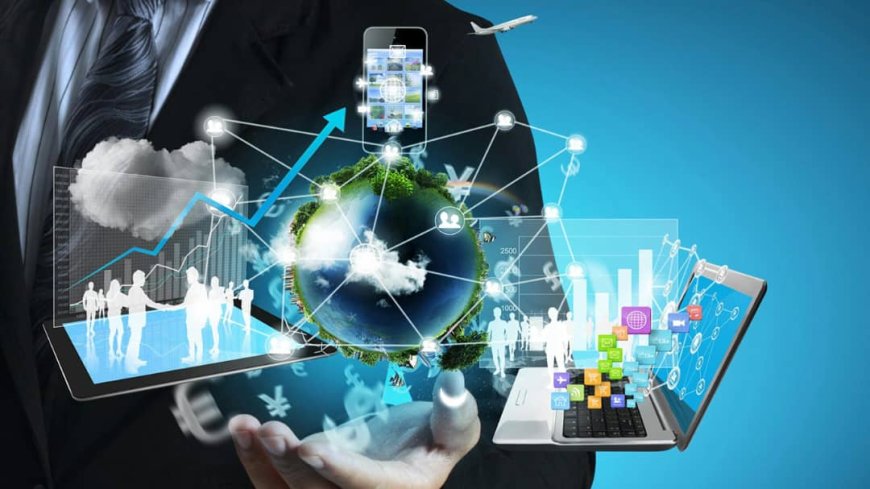What technology could look like in the next decade
Explore how technology has transformed communication, healthcare, education, and society—and what the future holds for a more connected world. Meta Description (max ~160 characters): From landlines to AI, this article traces the evolution of technology, its impact on daily life, and the ethical challenges we must navigate moving forward.

When I was younger, phones weren’t something everyone had. I remember how exciting it was just to use the big landline phone in the living room — and even then, we had to wait for our turn. Over time, we moved from those bulky devices to flip phones, and now to sleek smartphones that can do almost anything. It wasn’t just communication that changed. Back then, learning was limited to the four walls of a classroom; no one spoke about online learning or virtual classrooms. In hospitals too, everything was done manually — from record keeping to appointments. Looking back, it’s amazing to see how technology has transformed every part of our lives.
Technology, in its simplest form, refers to the use of scientific knowledge and tools to solve problems,improve life, and make tasks easier. From the invention of the wheel to the development of artificial intelligence, technology has always played a central role in shaping the human society. Today, it touches every aspect of our lives-from how we communicate to how we learn,work and receive health care.
One powerful example of technology's current impact is in the healthcare sector. Software systems now help doctors store and retrieve patients' records instantly, track disease outbreaks and even perform remote surgeries using robotic tools. This has not only improved efficiency,but also saved countless lives. It shows us just how much value technology can bring when it's used to serve human needs. For example, hospitals using Electronic Health Records (EHR) can access patient histories within seconds, improving diagnosis speed and accuracy. In 2020, doctors in New York successfully performed a remote surgery using the Da Vinci Surgical system, a robotic platform controlled from miles away. These real-world advancements show how technology, when applied thoughtfully, can greatly enhance medical care and save lives.
Another example of evolving technology can be seen in advertising, especially billboards. Traditional paper billboards are quickly being replaced by digital ones that use LED screens and even Al to display ads that change based on the time of the day or the audience nearby. Some modern billboards use sensors or cameras to detect traffic flow or gather data, making advertising more targeted and efficient. This shows how technology is not just creating new systems, but also transforming old ones in smarter ways.
Looking ahead, the role of technology will only grow more significant. In the next decade, we can expect advanced artificial intelligence, virtual reality and automation to redefine how we learn and work. In education,virtual classrooms and AI tutors could become more widespread, providing personalised learning experiences to students regardless of their location. Workspaces may shift toward more hybrid models,with people working remotely using advanced collaboration tools. Society as a whole will likely become more connected,efficient and data-driven.
However,with these opportunities come serious challenges. As machines take over more tasks, job displacement could rise. Not everyone will have equal access to new technologies, which could widen the gap between the rich and the poor. There will also be ethical concerns like how much control we should give to AI,or how to protect personal data in a hyper-digital world.
To fully harness the potential of technology in the coming decade,society must prepare for both its promises and its problems. Governments,educators,and industries need to collaborate to ensure that technological advancements are inclusive and accessible. Training programs should be created to help workers adapt to new tools and roles,while schools must equip students with digital skills that prepare them for the future.
Companies like Google and Microsoft have already launched digital upskilling programs-Google's career certificates and Microsoft's Digital skills initiative aim to train millions of people globally in IT,data analysis,and more. In education,platforms like Khan Academy and Code.org are helping students build coding and critical thinking skills from an early age.
At the same time,ethical frameworks must be put in place to guide how technology is developed and used. Questions around privacy, automation, and human dignity must not be ignored. Technology should be a tool that empowers people, not something that replaces or devalues them.
In conclusion, technology has already transformed our world,and its influence will only deepen in the next decade. From education to the workplace and society at large,it brings the promise of efficiency,opportunity and innovation. But alongside these benefits lie real challenges-ethical, economic and social that must be addressed with responsibility and foresight. If we approach the future wisely, technology can be the key to a better, more connected world.







